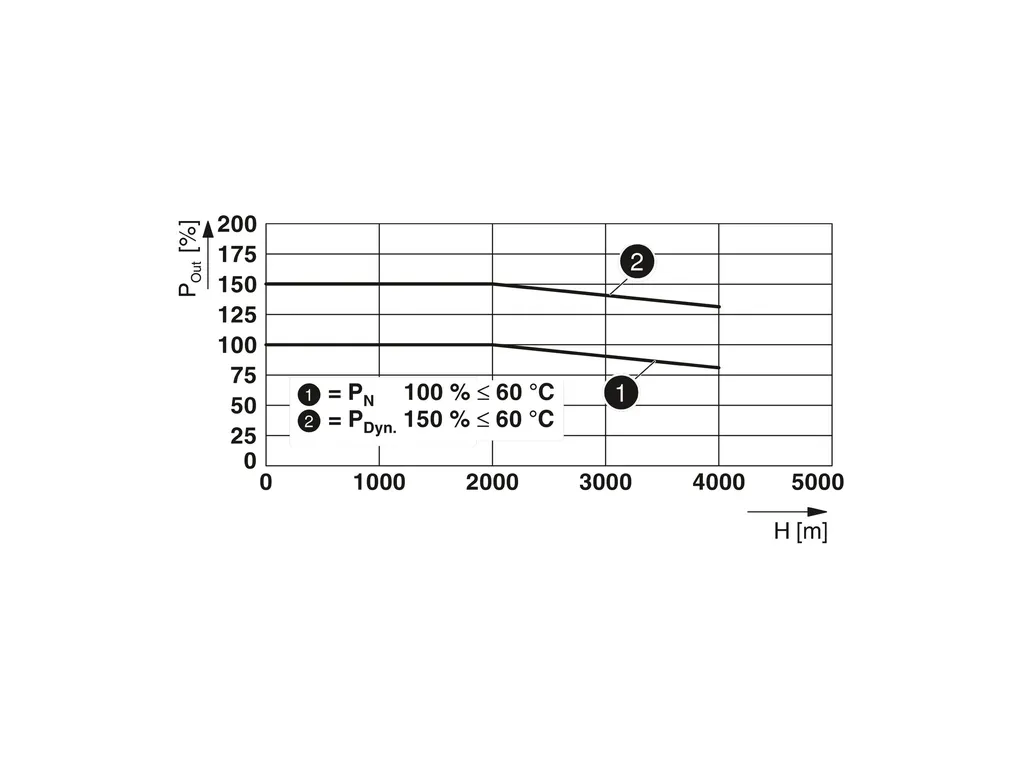| Input data | AC operation
Network type: Star network
Nominal input voltage range: 3x 400 VÃAC ... 500 VÃAC
Input voltage range: 3x 400 VÃAC ... 500 VÃAC -20Ã%Ã...Ã+15Ã%
Typical national grid voltage: 3x 400 VÃAC
3x 480 VÃAC
Voltage type of supply voltage: AC
Inrush current: ââ°¤ 30 A (typical)
Inrush current integral (I2t): < 1.1 A2s
Inrush current limitation: 35 A (after 1Ãms)
AC frequency range: 50 Hz ... 60 Hz
Frequency range (fN): 50 Hz ... 60 Hz ñ5ÃHz
Mains buffering time: > 10 ms (400ÃVÃAC)
> 20 ms (480ÃVÃAC)
Current consumption: 3x 1.9 A (400ÃVÃAC)
3x 1.7 A (500 V AC)
Nominal power consumption: 1335.1 VA
Protective circuit: Transient surge protection; Varistor
Power factor (cos phi): 0.77
Typical response time: < 1 s
Input fuse: 6.3 A (internal (device protection))
Recommended breaker for input protection: 10 A ... 16 A (Characteristics B, C, D, K)
Discharge current to PE: < 3.5 mA
< 2.5 mA (550 V AC, 60 Hz)
|
| Output data | Efficiency: > 94.6 % (400ÃVÃAC)
> 94.3 % (480ÃVÃAC)
Output characteristic: U/I with dynamic load reserve
Nominal output voltage: 72 VÃDC ñ1Ã%
Setting range of the output voltage (USet): 70 VÃDC ... 85 VÃDC (>Ã72 VÃDC, constant capacity restricted)
Nominal output current (IN): 14 A
Dynamic Boost (IDyn.Boost): 21 A (5 s)
Derating: > 60°C ... 70°C (2.5%/K)
Feedback voltage resistance: < 105 VÃDC
Protection against overvoltage at the output (OVP): ââ°¤ 105 VÃDC
Control deviation: < 1 % (change in load, static 10 % ... 90 %)
< 3 % (Dynamic load change 10 % ... 90 %, 10 Hz)
< 0.1 % (change in input voltage ñ10 %)
Residual ripple: ââ°¤ 300 mVPP
Short-circuit-proof: yes
No-load proof: yes
Output power: 1008 W
1512 W
Maximum no-load power dissipation: < 7 W (400ÃVÃAC)
Power loss nominal load max.: < 58 W (400ÃVÃAC)
Short-circuit current: < 23.5 AÃDC (Permanent)
Rise time: ââ°¤ 2 ms (UOUT (10 % ... 90 %))
Connection in parallel: yes
Connection in series: yes
Signal: DC OK
Continuous load current: 100 mA
Signal relay 13/14
Default: closed
Digital: 30 VÃAC 30 VÃDC 100 mA
|
| Connection data | Input
Connection method: Push-in connection
Conductor cross section, rigid min.: 0.2 mm²
Conductor cross section, rigid max.: 4 mm²
Conductor cross section flexible min.: 0.2 mm²
Conductor cross section flexible max.: 4 mm²
Single conductor/flexible terminal point with ferrule with plastic sleeve, min.: 0.2 mm²
Single conductor/flexible terminal point with ferrule with plastic sleeve, max.: 2.5 mm²
Single conductor/flexible terminal point with ferrule without plastic sleeve, min.: 0.2 mm²
Single conductor/flexible terminal point with ferrule without plastic sleeve, max.: 2.5 mm²
Conductor cross section AWG min.: 24
Conductor cross section AWG max.: 12
Stripping length: 10 mm
Output
Connection method: Push-in connection
Conductor cross section, rigid min.: 0.75 mm²
Conductor cross section, rigid max.: 16 mm²
Conductor cross section flexible min.: 0.75 mm²
Conductor cross section flexible max.: 16 mm²
Single conductor/flexible terminal point with ferrule with plastic sleeve, min.: 0.75 mm²
Single conductor/flexible terminal point with ferrule with plastic sleeve, max.: 10 mm²
Single conductor/flexible terminal point with ferrule without plastic sleeve, min.: 0.75 mm²
Single conductor/flexible terminal point with ferrule without plastic sleeve, max.: 16 mm²
Conductor cross section AWG min.: 20
Conductor cross section AWG max.: 4
Stripping length: 18 mm
Signal
Connection method: Push-in connection
Conductor cross section, rigid min.: 0.2 mm²
Conductor cross section, rigid max.: 0.75 mm²
Conductor cross section flexible min.: 0.2 mm²
Conductor cross section flexible max.: 1.5 mm²
Single conductor/flexible terminal point with ferrule with plastic sleeve, min.: 0.2 mm²
Single conductor/flexible terminal point with ferrule with plastic sleeve, max.: 0.75 mm²
Single conductor/flexible terminal point with ferrule without plastic sleeve, min.: 0.2 mm²
Single conductor/flexible terminal point with ferrule without plastic sleeve, max.: 1 mm²
Conductor cross section AWG min.: 24
Conductor cross section AWG max.: 18
Stripping length: 8 mm
|
| Signaling | Types of signaling: LED
Floating signal contact
Signal output: LED status indicator
Signalization designation: DC OK
Status display: LED
Color: green
DC OK: UOUT > 0.95 x UN (UN = 72ÃVÃDC)
|
| Electrical properties | Number of phases: 3.00
Insulation voltage input/output: 3 kV AC (type test)
1.5 kV AC (routine test)
|
| Product properties | Product type: Power supply
Product family: TRIO POWER
MTBF (IEC 61709, SN 29500): > 1730000 h (25ðC)
> 1051000 h (40ðC)
> 510000 h (60ðC)
Insulation characteristics
Protection class: I (in closed control cabinet)
Degree of pollution: 2
|
| Dimensions | Width: 110 mm
Height: 130 mm
Depth: 160 mm
Installation dimensions
Installation distance right/left: 0 mm / 0 mm
Installation distance top/bottom: 50 mm / 50 mm
|
| Mounting | Mounting type: DIN rail mounting
Assembly instructions: alignable: horizontally 0 mm (ââ°¤ 40°C) 10 mm (ââ°¤ 70°C), vertically 50 mm
Mounting position: horizontal DIN rail NS 35, EN 60715
With protective coating: No
|
| Material specifications | Flammability rating according to ULÃ94 (housing / terminal blocks): V0
Housing material: Plastic
Type of housing: Aluminum (AlMg3)
Hood version: Polycarbonate
|
| Environmental and real-life conditions | Ambient conditions
Degree of protection: IP20
Ambient temperature (operation): -25°C ... 70°C (>Ã60ðC Derating: 2,5Ã%/K)
Ambient temperature (storage/transport): -40°C ... 85°C
Ambient temperature (start-up type tested): -40°C
Maximum altitude: ââ°¤ 4000 m (>Ã2000Ãm, Derating: 10Ã%/1000Ãm)
Climatic class: 3K3 (in acc. with EN 60721)
Max. permissible relative humidity (operation): ââ°¤ 95 % (at 25°C, non-condensing)
Shock: 11Ãms, 15Ãg, in each space direction (according to IEC 60068-2-27)
Vibration (operation): < 15 Hz, amplitude ñ2.5 mm (according to IEC 60068-2-6)
15 Hz ... 150 Hz, 0.7g, 90 min.
|
| Standards and regulations | Standard ââ¬Ã¢ Limitation of mains harmonic currents: ENÃ61000-3-2
Standard - Electrical safety: IEC 61010-2-201
Standard - Safe isolation: DINÃVDEÃ0100-410
Standard - Safety of transformers: ENÃ61558-2-16 (air clearances and creepage distances only)
Overvoltage category
EN 61010-1: IIÃ(ââ°¤Ã2000Ãm)
|
| Approvals | UL approvals: UL/C-UL Listed ULÃ61010-1
Conformity/Approvals
SIL in accordance with IEC 61508: 0
|
| EMC data | Low Voltage Directive: Conformance with Low Voltage Directive 2014/35/EC
Interference emission: Interference emission in accordance with ENÃ61000-6-3 (residential and commercial) and ENÃ61000-6-4 (industrial)
EMC requirements for noise immunity: ENÃ61000-6-1
ENÃ61000-6-2
Electromagnetic compatibility: Conformance with EMC Directive 2014/30/EU
Conducted noise emission: ENÃ55016-2-1
ENÃ61000-6-4 (Class A)
Noise emission: EN 55011 (EN 55022)
ENÃ55016-2-3
ENÃ61000-6-4 (Class A)
Harmonic currents
Standards/regulations: ENÃ55016-2-3
ENÃ61000-3-2 (Class A)
Flicker
Standards/regulations: ENÃ61000-3-3
Electrostatic discharge
Standards/regulations: ENÃ61000-4-2
Electrostatic dischargeââ¬Ã¢¹
Contact discharge: 6 kV (Test Level 3)
Discharge in air: 8 kV (Test Level 3)
Comments: Criterion A
Electromagnetic HF field
Standards/regulations: ENÃ61000-4-3
Electromagnetic HF fieldââ¬Ã¢¹
Frequency range: 80 MHz ... 1 GHz
1 GHz ... 2 GHz
2 GHz ... 6 GHz
Test field strength: 10 V/m (Test Level 3)
Comments: Criterion A
Fast transients (burst)
Standards/regulations: ENÃ61000-4-4
Fast transients (burst)ââ¬Ã¢¹
Input: 4 kV (Test Level 3 - asymmetrical)
Output: 2 kV (Test Level 3 - asymmetrical)
Signal: 2 kV (Test Level 3 - asymmetrical)
Comments: Criterion A
Surge voltage load (surge)
Standards/regulations: ENÃ61000-4-5
Input: 2 kV (Test Level 4 - symmetrical)
4 kV (Test Level 4 - asymmetrical)
Output: 1 kV (Test Level 3 - symmetrical)
2 kV (Test Level 3 - asymmetrical)
Signal: 1 kV (Test Level 2 - asymmetrical)
Comments: Criterion A
Conducted interference
Standards/regulations: ENÃ61000-4-6
Conducted interferenceââ¬Ã¢¹
Input/Output: asymmetrical
Frequency range: 0.15 MHz ... 80 MHz
Comments: Criterion A
Voltage: 10 V (Test Level 3)
Voltage dips
Standards/regulations: ENÃ61000-4-11
Voltage: 400 VÃAC
Frequency: 50 Hz
Voltage dip: 70 %
40 %
0 %
Number of periods: 25 periods
10 periods
1 period
Comments: Criterion A
Emitted interference
Standards/regulations: ENÃ61000-6-3
Radio interference voltage in acc. with EN 55011: ENÃ55011 (ENÃ55022) ClassÃB, area of application: Industry and residential
Emitted radio interference in acc. with EN 55011: EN 55011 (EN 55022) Class B, area of application: Industry and residential
Criteria
Criterion A: Normal operating behavior within the specified limits.
Criterion B: Temporary impairment to operational behavior that is corrected by the device itself.
Criterion C: Temporary adverse effects on the operating behavior, which the device corrects automatically or which can be restored by actuating the operating elements.
|
 Non disponibile
Non disponibile 





